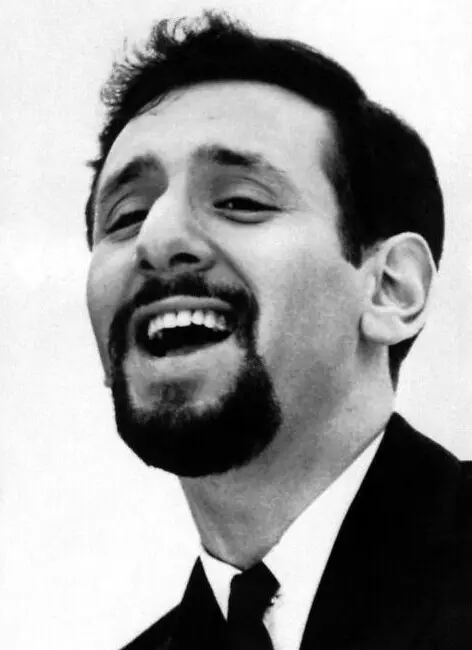Peter Yarrow, folk singer of Peter, Paul and Mary fame, dies at 86
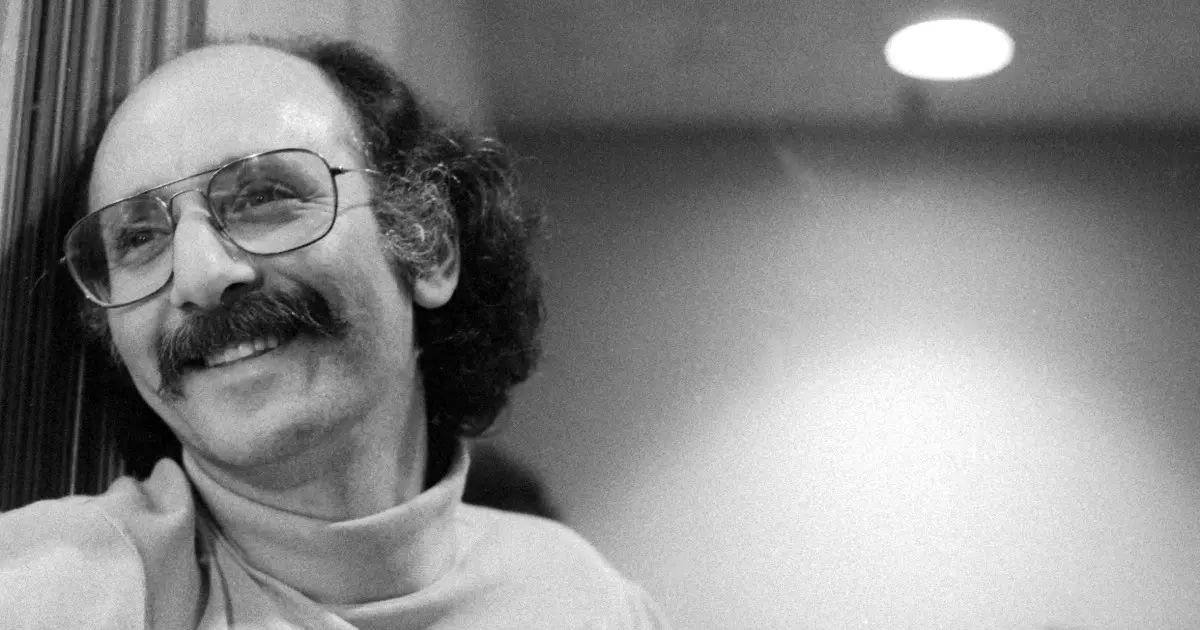
Folk singer Peter Yarrow — writer of the timeless classic "Puff the Magic Dragon" andone-third of the legendary folk trio Peter, Paul and Mary— died Tuesday, a family representative said.
He was 86 andhad been diagnosed with bladder cancer four years ago.
Yarrow died in New York City with loved ones by his side, publicist Ken Sunshine confirmed to NBC News.
Daughter Bethany Yarrow said in a statement: “Our fearless dragon is tired and has entered the last chapter of his magnificent life. The world knows Peter Yarrow the iconic folk activist, but the human being behind the legend is every bit as generous, creative, passionate, playful, and wise as his lyrics suggest.”
Mary Travers, 72, died in 2009, leaving Noel Paul Stookey, 87, as the last surviving member of Peter, Paul and Mary.
The trio's songs were part of the soundtrack for the Civil Rights and anti-Vietnam War movements.Yarrow co-wrote the group’s most enduring song, “Puff the Magic Dragon,” based on a poem by the late Lenny Lipton.
The trio joined other notable acts of the time, including Joan Baez and Bob Dylan, at the 1963 March on Washington when Martin Luther King Jr. delivered his famous “I Have a Dream” speech.
They went to Washington that day at the invitation of Harry Belafonte.
"At the time, the country was saying a pledge of allegiance, 'With liberty and justice for all,' but it was fatuous because it wasn’t for all," Yarrow would say years later.
"People of color did not have justice. They did not have freedom. They couldn't vote. In Washington, D.C., if you were a person of color, you couldn't use a public bathroom. You couldn't use the water fountain unless it said, 'For colored only.' So when Peter, Paul and Mary were approached by Harry Belafonte, we, of course, said yes. We were well prepared to sing what we sang."
Other hits by the trio included "Blowin' in the Wind," "Leaving on a Jet Plane," "Lemon Tree" and "Don’t Think Twice, It’s All Right.”
Stookey said that growing up as an only child, he never knew what it was like to have a brother until he met Yarrow. They were best men at each other's weddings.
"He was a loving ‘uncle’ to my three daughters. And, while his comfort in the city and my love of the country tended to keep us apart geographically, our different perspectives were celebrated often in our friendship and our music," Stookey said in a statement.
"I was five months older than Peter — who became my creative, irrepressible, spontaneous and musical younger brother — yet at the same time, I grew to be grateful for, and to love, the mature-beyond-his-years wisdom and inspiring guidance he shared with me like an older brother. Politically astute and emotionally vulnerable, perhaps Peter was both of the brothers I never had ... and I shall deeply miss both of him."
Yarrow kept a relatively low profile later in life after he was convicted in 1970 of molesting a 14-year-old girl in a Washington, D.C., hotel room in 1969.
He spent three months behind bars and was pardoned by President Jimmy Carter just before his term ended in 1981.
The assault permanently stained Yarrow's reputation, particularly in the #MeToo era, as he was regularly disinvited from events once his name became known as a performing guest.
Yarrow didn't dispute his acts.
“I fully support the current movements demanding equal rights for all and refusing to allow continued abuse and injury — most particularly of a sexual nature, of which I am, with great sorrow, guilty,” Yarrow said in a statement to The New York Times after invitation to a 2019 festival in Binghamton, New Yorkwas withdrawn.
“I do not seek to minimize or excuse what I have done and I cannot adequately express my apologies and sorrow for the pain and injury I have caused in this regard,” he said.
Yarrow is survived by his wife, Marybeth; a son, Christopher; a daughter, Bethany; and a granddaughter, Valentina.
Yarrow's family asked fans to make donations in his honor to the nonprofit anti-bullying campaign Operation Respect.
"Driven by a deep belief that a more compassionate and respectful world is possible, my father has lived a cause driven life full of love and purpose," Bethany Yarrow said. "He always believed, with his whole heart, that singing together could change the world. Please don’t stop believing in magic dragons. Hope dies when we stop believing, stop caring, and stop singing."
Peter Yarrow of folk-music trio Peter, Paul and Mary dies at 86
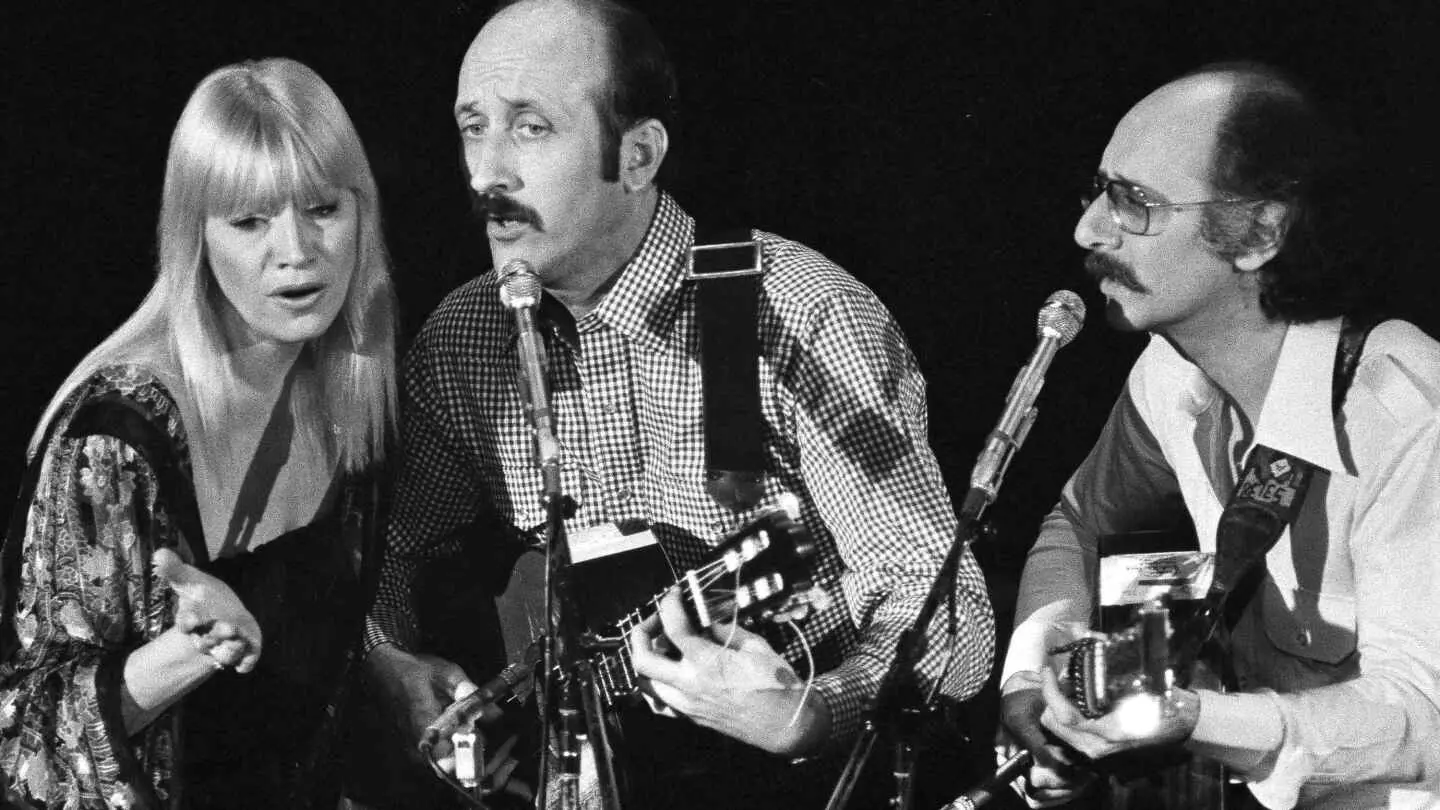
LOS ANGELES (AP) — Peter Yarrow, the singer-songwriter best known as one-third of Peter, Paul and Mary, the folk-music trio whose impassioned harmonies transfixed millions as they lifted their voices in favor of civil rights and against war, has died. He was 86.
Yarrow, who also co-wrote the group’s most enduring song, “Puff the Magic Dragon,” died Tuesday in New York, publicist Ken Sunshine said. Yarrow had bladder cancer for the past four years.
“Our fearless dragon is tired and has entered the last chapter of his magnificent life. The world knows Peter Yarrow the iconic folk activist, but the human being behind the legend is every bit as generous, creative, passionate, playful, and wise as his lyrics suggest,” his daughter Bethany said in a statement.
During an incredible run of success spanning the 1960s, Yarrow, Noel Paul Stookey and Mary Travers released six Billboard Top 10 singles, two No. 1 albums and won five Grammys.
They also brought early exposure to Bob Dylan by turning two of his songs, “Don’t Think Twice, It’s All Right” and “Blowin’ in the Wind,” into Billboard Top 10 hits as they helped lead an American renaissance in folk music. They performed “Blowin’ in the Wind” at the 1963 March on Washington at which the Rev. Martin Luther King Jr. delivered his famous “I Have a Dream” speech.
Yarrow played roles onstage and offstage at the iconic Newport Folk Festival in 1965 when Dylan went electric. Yarrow was on the festival board and emceed the show, begged Dylan to go back on to play another song after his blistering set, a scene captured in the 2024 biopic “A Complete Unknown.” Dylan took Yarrow’s acoustic guitar and played “It’s All Over Now, Baby Blue.”
After an eight-year hiatus to pursue solo careers, the trio reunited in 1978 for a “Survival Sunday,” an anti-nuclear-power concert that Yarrow had organized in Los Angeles. They would remain together until Travers’ death in 2009. Upon her passing, Yarrow and Stookey continued to perform both separately and together.
Born May 31, 1938, in New York, Yarrow was raised in an upper middle class family he said placed high value on art and scholarship. He took violin lessons as a child, later switching to guitar as he came to embrace the work of such folk-music icons as Woody Guthrie and Pete Seeger.
Upon graduating from Cornell University in 1959, he returned to New York, where he worked as a struggling Greenwich Village musician until connecting with Stookey and Travers. Although his degree was in psychology, he had found his true calling in folk music at Cornell when he worked as a teaching assistant for a class in American folklore his senior year.
“I did it for the money because I wanted to wash dishes less and play guitar more,” he told the late record company executive Joe Smith. But as he led the class in song, he began to discover the emotional impact music could have on an audience.
“I saw these young people at Cornell who were basically very conservative in their backgrounds opening their hearts up and singing with an emotionality and a concern through this vehicle called folk music,” he said. “It gave me a clue that the world was on its way to a certain kind of movement, and that folk music might play a part in it and that I might play a part in folk music.”
Soon after returning to New York, he met impresario Albert Grossman, who would go on to manage Dylan, Janis Joplin and others and who at the time was looking to put together a group that would rival the Kingston Trio, which in 1958 had a hit version of the traditional folk ballad “Tom Dooley.”
But Grossman wanted a trio with a female singer and a member who could be funny enough to keep an audience engaged with comic patter. For the latter, Yarrow suggested a guitar-strumming Greenwich Village comic he’d seen named Noel Stookey.
Stookey, who would use his middle name as a member of the group, happened to be a friend of Travers, who as a teenager had performed and recorded with Pete Seeger and others. Gripped by stage fright, she was reluctant to join the pair at first, changing her mind after she heard how well her contralto voice melded with Yarrow’s tenor and Stookey’s baritone.
“We called Noel up. He was there,” Yarrow said, recalling the first time the three performed together. “We mentioned a bunch of folk songs, which he didn’t know because he didn’t have a real folk-music background, and wound up singing ‘Mary Had a Little Lamb.’ And it was immediately great, was just as clear as a bell, and we started working.”
After months of rehearsal the three became an overnight sensation when their first album, 1962’s eponymous “Peter, Paul and Mary,” reached No. 1 on the Billboard chart. Their second, “In the Wind,” reached No. 4 and their third, “Moving,” put them back at No. 1.
From their earliest albums, the trio sang out against war and injustice in songs like Seeger’s “If I Had a Hammer” and “Where Have all the Flowers Gone,” Dylan’s “Blowin’ in the Wind” and “When the Ship Comes In” and Yarrow’s own “Day is Done.”
They could also show a soft and poignant side, particularly on “Puff the Magic Dragon,” which Yarrow had written during his Cornell years with college friend Leonard Lipton.
It tells the tale of Jackie Paper, a young boy who embarks on countless adventures with his make-believe dragon friend until he outgrows such childhood fantasies and leaves a sobbing, heartbroken Puff behind. As Yarrow explains: “A dragon lives forever, but not so little boys.”
Some insisted they heard drug references in the song, a contention at the heart of a famous scene in the film “Meet the Parents,” when Ben Stiller angers his girlfriend’s tightly wound father (Robert De Niro) by saying “puff” refers to marijuana smoke. Yarrow maintained it reflected the loss of childhood innocence and nothing more.
After recording their last No. 1 hit, a 1969 cover of John Denver’s “Leaving on a Jet Plane,” the trio split up the following year to pursue solo careers.
That same year Yarrow had pleaded guilty to taking indecent liberties with a 14-year-old girl who had come to his hotel room with her older sister to ask for autographs. The pair found him naked when he answered the door and let them in. Yarrow, who resumed his career after serving three months in jail, was pardoned by President Jimmy Carter in 1981. Over the decades, he apologized repeatedly.
“I fully support the current movements demanding equal rights for all and refusing to allow continued abuse and injury — most particularly of a sexual nature, of which I am, with great sorrow, guilty,” he told The New York Times in 2019 after being disinvited from a festival over the sentence.
Over the years, Yarrow continued to write and co-write songs, including the 1976 hit “Torn Between Two Lovers” for Mary MacGregor. He received an Emmy nomination in 1979 for the animated film “Puff the Magic Dragon.”
Later songs include the civil rights anthem “No Easy Walk to Freedom,” co-written with Margery Tabankin, and “Light One Candle,” calling for peace in Lebanon.
Yarrow, who with Travers and Stookey had supported Democratic Sen. Eugene McCarthy’s 1968 presidential bid, met the Minnesota senator’s niece, Mary Beth McCarthy, at a campaign event. The couple married the following year. They had two children before divorcing. They remarried in 2022.
In addition to his wife and daughter, he is survived by a son, Christopher, and a granddaughter, Valentina.
AP Entertainment Writer Mark Kennedy contributed reporting from New York. Rogers, the principal writer of this obituary, retired from The Associated Press in 2021.
Peter Yarrow from Peter, Paul and Mary folk music trio dies aged 86
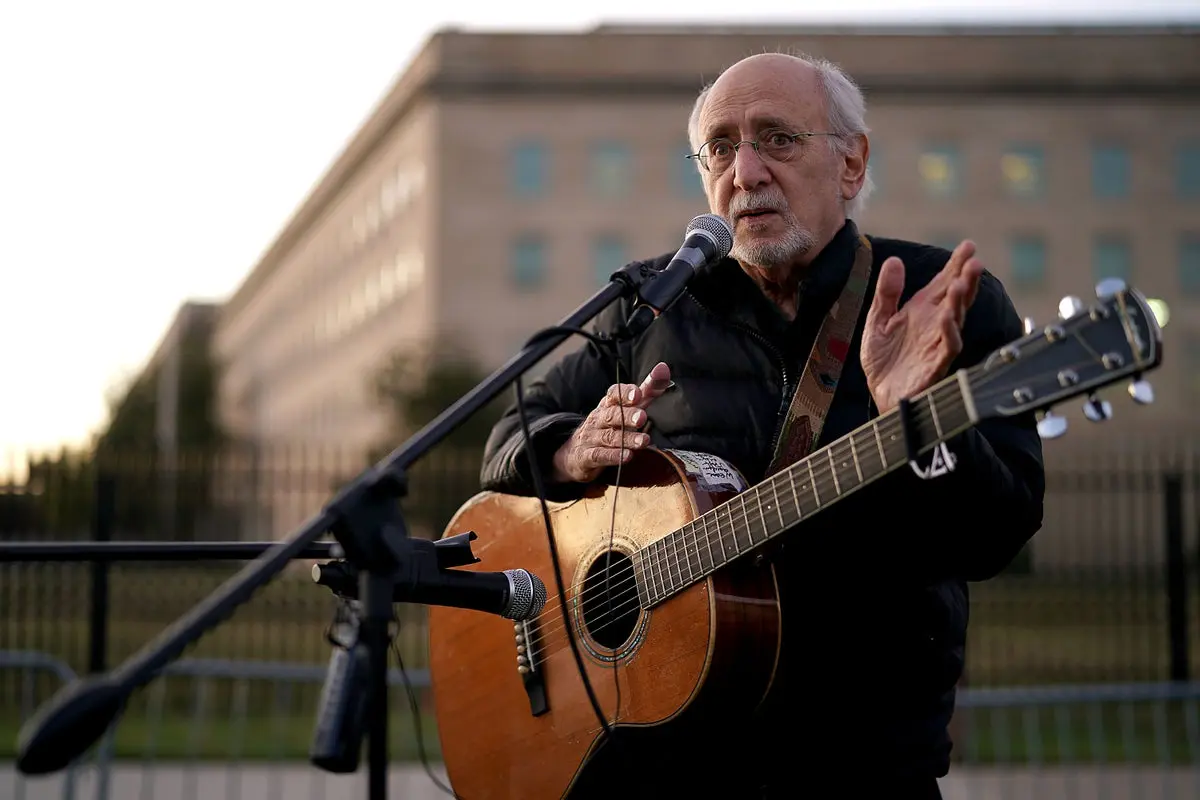
Peter Yarrow of the folk trio Peter, Paul and Mary has died at the age of 86.
The singer died on Tuesday (January 7) at his home on the Upper West Side of Manhattan.
Yarrow’s death was confirmed by his publicist, Ken Sunshine, who shared that Yarrow died from bladder cancer, which he had been battling for the past four years.
The tenor was known for bringing his gentle vocals to the group, which became one of the most popular folk acts of the Sixties.
Formed in 1961 by Yarrow, Noel Paul Stookey and Mary Travers, the three-piece act is best known for their hits “Puff the Magic Dragon,” “Where Have All the Flowers Gone,” “Leavin’ on a Jet Plane,” and “Don’t Think Twice, It’s All Right.”
Yarrow often co-wrote their songs with Stookey, who is now the last surviving member of the group. Travers died of leukemia in 2009, aged 72.
In a statement, per The New York Times, Stooky remembered Yarrow as a “creative, irrepressible, spontaneous and musical younger brother” who he “grew to be grateful for, and to love, the mature-beyond-his-years wisdom and inspiring guidance he shared with me like an older brother.”
“Perhaps Peter was both of the brothers I never had,” Stookey added, “and I shall deeply miss both of him.”
While the group often split vocals equally, Yarrow did take the lead on several of the songs, including “Puff,” “Day Is Done” and “The Great Mandala.”
Several of Peter, Paul and Mary’s songs charted on Billboard, with their cover of John Denver’s “Leavin’ on a Jet Plane” landing at No. 1.
They eventually split up in 1970 to pursue solo careers; however, they continued collaborating on music and reuniting for benefit concerts in the decades to follow.
“This is a relationship, with all three of us, that has gone through terrible fights and wonderful making up,” Yarrow told The New York Times in 1986. “These days, Noel and I write the songs, and Mary writes the poetry and the speeches.’’
Born on May 31, 1938 in New York City to Ukrainian Jewish immigrants, Yarrow graduated from Cornell University in 1959 with a bachelor’s degree in psychology.
During his final year at Cornell, he began singing and playing guitar after taking an American folk literature course taught by the folklorist and historian Harold William Thompson.
Upon graduating, he moved back to New York City and joined the folk music scene of Greenwich Village.
Yarrow was married to Mary Beth McCarthy, the niece of Democratic presidential candidate Eugene McCarthy, for 12 years before they divorced in 1981. They later remarried in 2022.
He is survived by McCarthy; a son, Christopher; a daughter, Bethany; and a granddaughter.
Peter Yarrow, legendary Peter, Paul and Mary singer, dead at 86
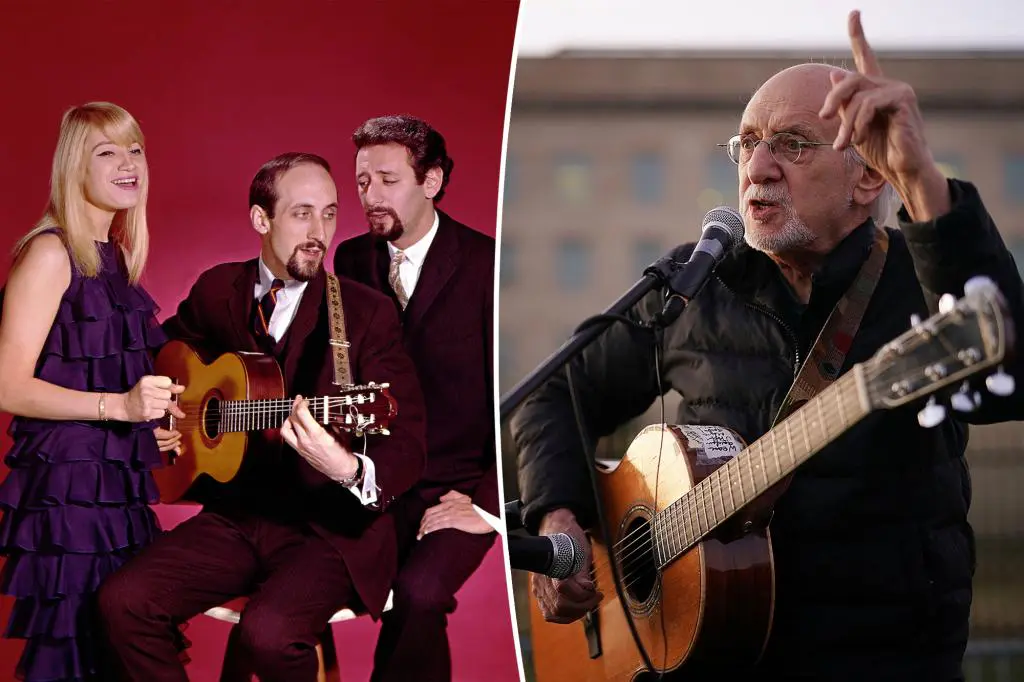
Peter Yarrow, one of three singers in the 1960s folk group Peter, Paul and Mary, has died. He was 86.
Yarrow passed away Tuesday after a four-year battle with bladder cancer, his publicist confirmed to the Guardian.
His daughter Bethany said in a statement, “Our fearless dragon is tired and has entered the last chapter of his magnificent life. The world knows Peter Yarrow the iconic folk activist, but the human being behind the legend is every bit as generous, creative, passionate, playful, and wise as his lyrics suggest.”
The Post has reached out to Yarrow’s rep.
Before his death, Yarrow’s kids set up a “living tribute” website for the famous musician. They asked fans and friends to submit messages, photos or videos in Yarrow’s honor.
The website also includes updates from Yarrow’s family that they were sharing before he passed away. The latest message was shared by Bethany on Jan. 3 about the family celebrating Hanukkah together.
“Peter is very weak physically, but his spirit is strong and his light is growing brighter every day,” Bethany also said. “We won’t let the light go out! We love you Peter!!!!!!!!!!!!!!!!!!!!!!!!!!”
Yarrow, Paul Stookey and Mary Travers were members of one of the most famous folk groups in music history.
With Lenny Lipton, Yarrow co-wrote the group’s iconic song “Puff, the Magic Dragon,” which came out in 1963.
Peter, Paul and Mary released 13 albums from 1962 to 2004. They won five Grammys out of 16 nominations.
After Travers’ death in 2009, Yarrow and Stookey, 87, continued performing as a duo.
Yarrow was also a major political activist who opposed the Vietnam War.
In August 1963, Peter, Paul and Mary performed a cover of Bob Dylan’s “Blowin’ in the Wind” on the steps of the Lincoln Memorial at the March on Washington.
In 1970, Yarrow was convicted of “taking indecent liberties” with a 14-year-old girl in a Washington, DC, hotel room.
According to the Washington Post, Yarrow said at his sentencing hearing that the encounter was consensual.
He was sentenced to one to three years in prison but only served three months before being released. He was later pardoned by President Jimmy Carter in January 1981, one day before Carter’s term ended. Carter passed away at 100 just over a week before Yarrow died.
Yarrow reportedly said in his petition to Carter that a presidential pardon would help his young kids understand that “society has forgiven their father” and may help lessen the “sense of shame that they will inevitably feel.”
In 2021, Yarrow was accused in a lawsuit of raping an underage girl in an NYC hotel in 1969. The lawsuit was settled privately, per the Washington Post.
Yarrow has two children, daughter Bethany and son Christopher, with ex-wife Mary Beth McCarthy. They were married from 1969 to 1981.
Peter Yarrow's Cause of Death Revealed After Peter, Paul and Mary Star Dies at 86
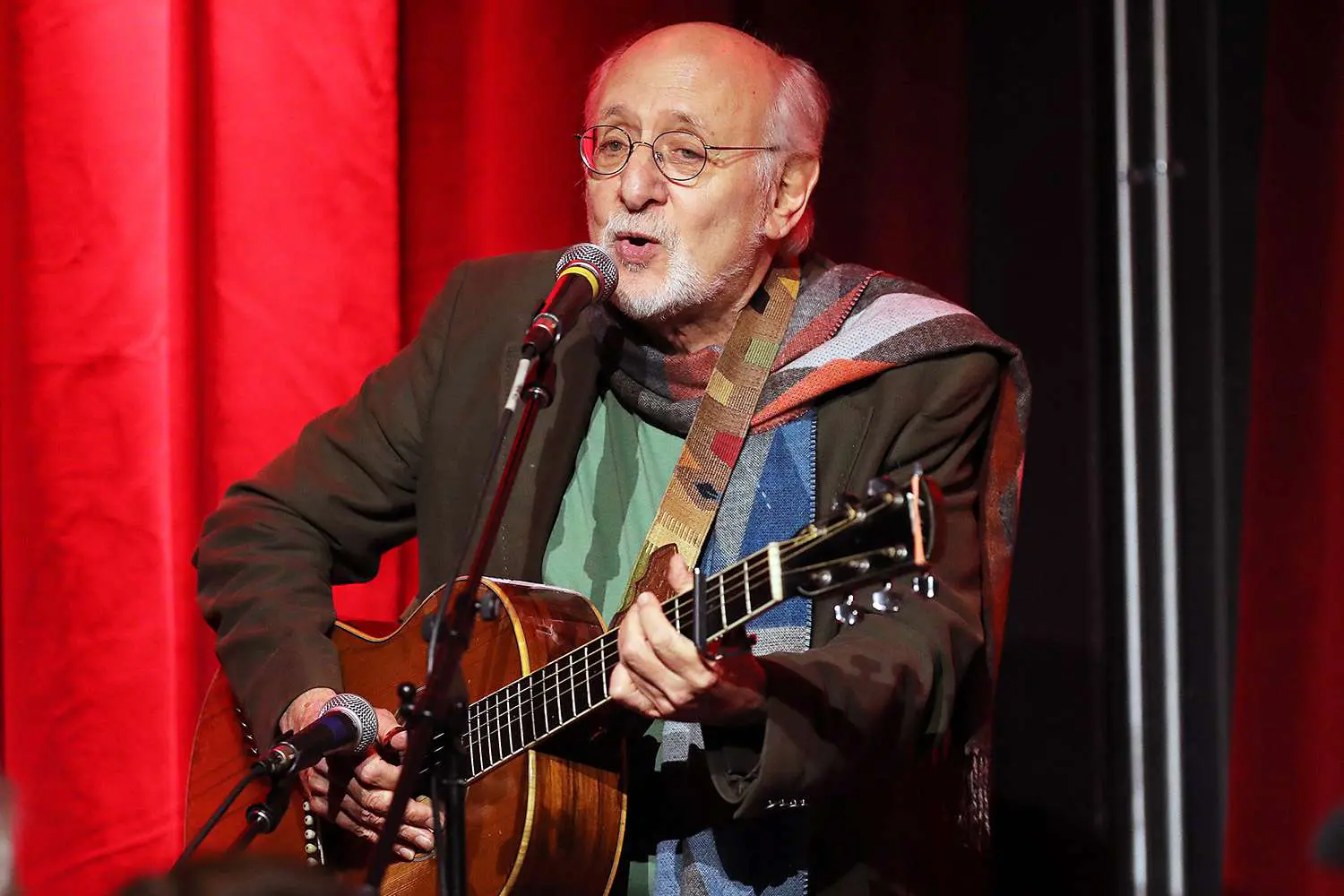
Peter Yarrow’s cause of death has been revealed.
The Peter, Paul and Mary musician died of bladder cancer, with which he was diagnosed in 2021. Yarrow, 86, died at his home in New York City on Tuesday, Jan. 7.
The Grammy-winning folk singer-songwriter and activist had been “battling cancer for some time,” his son Christopher and daughter Bethany wrote in a statement shared in December, in which they asked fans and friends to leave living tributes for Yarrow.
“He has kept his doctors in awe at his resilience as he has continued to perform and live life in his own generous and cause-driven way. It has been a long road and he has been a strong dragon, but right now he is very weak and, at 86, his dragon days are numbered,” they wrote.
In an interview he did this past summer with former NFL player Rolf Benirschke for The Phoenix Magazine, Yarrow opened up about living with an ostomy after having his bladder surgically removed during cancer treatments (An ostomy is a surgically created opening in the abdomen that allows waste or urine to leave the body, per the Mayo Clinic).
The singer said that after being diagnosed with bladder cancer in 2021, he underwent three months of chemotherapy — but “everything went wrong.”
“I had GI tract issues, rashes, terrible nausea, lost my appetite, and I lost 25 pounds... A lot for a slight man in my eighties,” he said.
It was at that point that Yarrow had his bladder removed — and learned his treatment was unsuccessful. His doctors then suggested he try a new immunotherapy that would not cure his cancer, but could prolong his life, and he went ahead.
“I was raring to go. I wanted to take on this cancer,” he told Benirschke. “I wanted the best shot and if my best shot was to go through what turned out to be another terribly punishing course of immunotherapy, I simply wanted to get on with it.”
Yarrow said he hoped that by speaking about his experience with cancer and with an ostomy, he could inspire others.
“It is my hope that my words and my story help to reassure my ostomy brothers and sisters. This is a challenge but life actually becomes brighter after you have an ostomy. For me, life has become more precious, present and rewarding,” he said.
Yarrow previously advocated for colonoscopies and early cancer screenings in 2010, when he wrote and performed “The Colonoscopy Song” on CBS’ The Early Show.
Just four days prior to his death, the star’s daughter Bethany wrote that Yarrow was “very weak physically, but his spirit is strong and his light is growing brighter every day.”
In December, she shared a photo of his Peter, Paul and Mary bandmate Noel Paul Stookey visiting him and reading a preview of his upcoming autobiography.
“A day of memories, presence, tears of gratitude and acknowledgement of all these years of brotherhood and adventure,” Bethany wrote.
